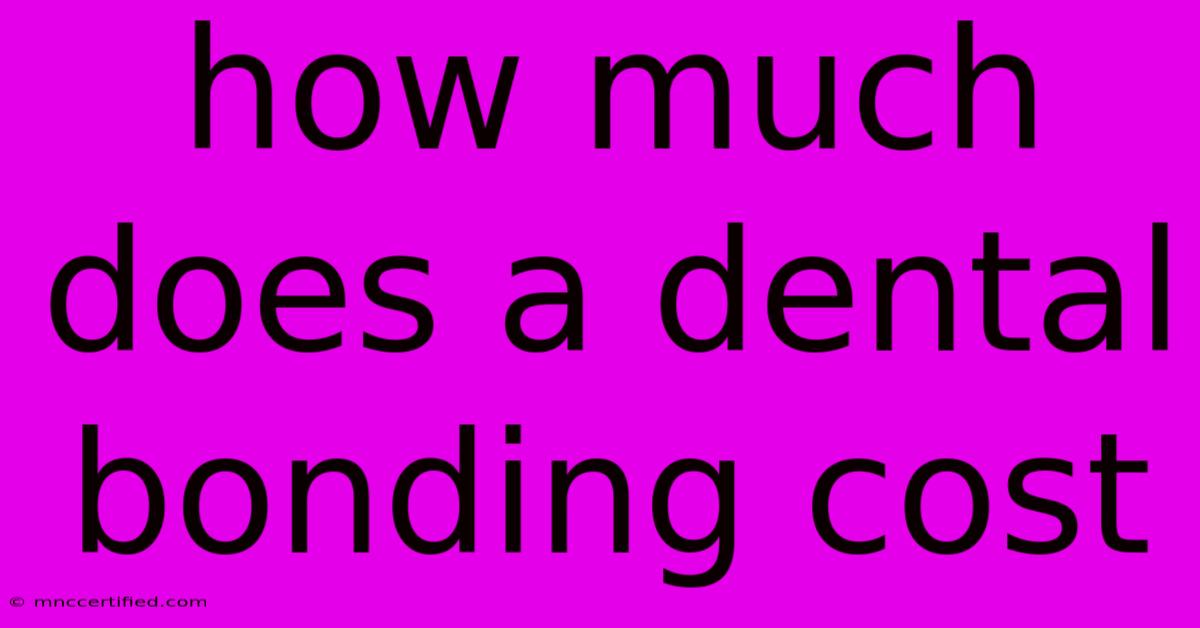How Much Does A Dental Bonding Cost

Table of Contents
How Much Does Dental Bonding Cost? A Comprehensive Guide
Dental bonding is a popular cosmetic dentistry procedure that can transform your smile by repairing chips, cracks, gaps, and discoloration. But before you schedule your appointment, you're probably wondering: How much does dental bonding cost?
The answer, unfortunately, isn't straightforward. The cost of dental bonding varies greatly depending on several factors, including:
- The size and complexity of the repair: Larger areas requiring more bonding material will naturally cost more.
- The number of teeth being bonded: If you're bonding multiple teeth, the total cost will increase proportionally.
- Your location: Dental costs can vary significantly from one city to another.
- The experience and qualifications of your dentist: More experienced dentists may charge higher fees.
- The type of bonding material used: Some bonding materials are more expensive than others.
What is Dental Bonding?
Dental bonding involves applying a tooth-colored resin material to the surface of a tooth. This resin is then shaped, hardened with a special light, and polished to match the surrounding teeth. It's a versatile procedure that can:
- Repair chipped or cracked teeth: Bonding can restore the shape and integrity of a damaged tooth.
- Close gaps between teeth: This can improve your smile's appearance and prevent food from getting trapped.
- Cover discolored teeth: Bonding can hide stains and make your teeth appear whiter.
- Improve the shape of teeth: You can use bonding to make teeth appear longer or wider.
Average Costs for Dental Bonding
It's difficult to give an exact price range for dental bonding. However, you can expect to pay between $100 and $500 per tooth.
Keep in mind: This is just an estimate. It's always best to consult with your dentist for a personalized quote based on your specific needs.
Is Dental Bonding Covered by Insurance?
Dental bonding is typically not covered by dental insurance because it's considered a cosmetic procedure. However, if the bonding is being done to repair a damaged tooth, you may be able to get some coverage. It's important to check with your insurance provider to see what's covered in your plan.
Alternatives to Dental Bonding
If you're looking for a more affordable option, there are some alternatives to dental bonding:
- Dental veneers: Veneers are thin, custom-made shells that are bonded to the front of your teeth. While veneers are more expensive than bonding, they can offer a more durable and long-lasting solution.
- Tooth-colored fillings: Fillings can be used to repair minor chips or cracks. They are often a more budget-friendly option than bonding.
Finding the Right Dentist
When choosing a dentist for dental bonding, it's essential to find someone experienced and qualified. Look for a dentist who specializes in cosmetic dentistry and has a proven track record of satisfied patients.
Don't be afraid to ask questions: Discuss your goals for the procedure, your budget, and any concerns you have with the dentist.
Conclusion:
While the cost of dental bonding can vary, it's an effective and relatively affordable way to improve your smile. By understanding the factors that influence the cost, you can get a better idea of what to expect and make an informed decision about whether dental bonding is right for you. Remember, don't hesitate to contact your dentist to discuss your specific situation and get a personalized quote.

Thank you for visiting our website wich cover about How Much Does A Dental Bonding Cost. We hope the information provided has been useful to you. Feel free to contact us if you have any questions or need further assistance. See you next time and dont miss to bookmark.
Featured Posts
-
Green Bitcoin Price Prediction 2025
Nov 12, 2024
-
Mike Tyson Vs Jake Paul Presser Details
Nov 12, 2024
-
Aegon Self Invested Personal Pension
Nov 12, 2024
-
Five Letter Words Beginning With Ro
Nov 12, 2024
-
Dolphins Rams Week 10 Preview 4 Key Matchups
Nov 12, 2024